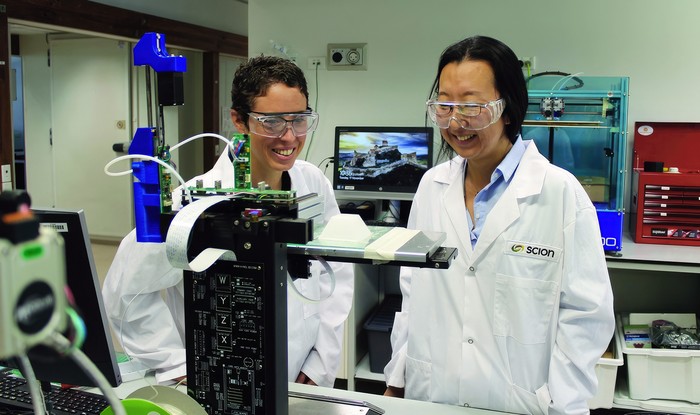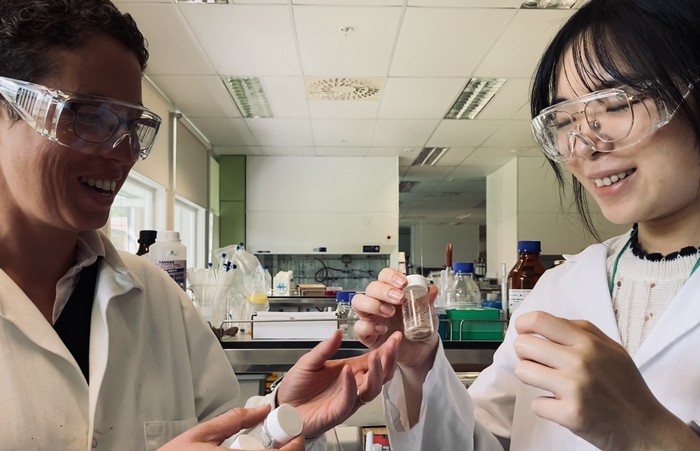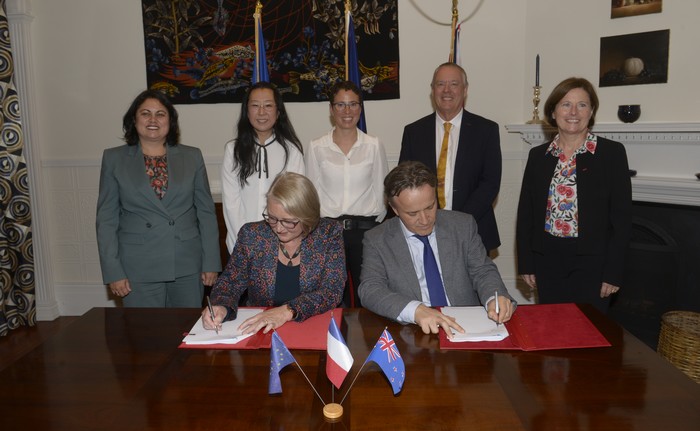Scientific cooperation extends biobased research

A new agreement is boosting opportunities for scientists to engage with researchers in France and take meaningful action on climate change.
An agreement signed between Scion and one of France’s key research organisations creates fresh opportunities to extend Scion’s research exploring biobased products and supports New Zealand’s transition to a circular bioeconomy.
Scion formalised a new agreement with the French National Research Institute for Agriculture, Food and the Environment (INRAE) at a special function held at the French Embassy in March.
Scion’s agreement with INRAE will enhance cooperation on research and innovation to accelerate biorefineries and biomaterials research – work that is developing alternative products to those made from fossil fuels as part of efforts to mitigate climate change.
Scion chief executive Dr Julian Elder says the agreement is a welcome boost to scientific cooperation between France and New Zealand.
“As a Crown Research Institute, we’ve had the pleasure of collaborating with INRAE for more than 20 years across many research areas,” he says.
“In the last decade, we’ve particularly benefited from our work with INRAE’s Transform division and research that has helped to characterise plant materials before their transformation into biobased products and materials used for 3D and 4D printing.
“Our intention with the new agreement is to build on this work and create an Associated International Laboratory. This will contribute to further bioproducts research, with a focus on advancing our knowledge and capabilities with biorefineries and plant materials that can be used to design fossil-free materials for the future.”
Scion’s biorefinery research is exploring new ways of creating high-value products from plant-based waste products, such as pine bark. It’s part of a wider programme of research focused on the circular bioeconomy that seeks to get the most value out of renewable biological resources while minimising waste.
The agreement with INRAE to create the Associated International Laboratory, known as LIA, also involves collaboration with two higher education partners in Montpellier, France: the University of Montpellier and the Institut Agro.
Scion general manager for Forests to Biobased Products Dr Florian Graichen says the agreement is timely and follows February’s announcement that New Zealand researchers can now participate in the Horizon Europe innovation and research programme.
The arrangement makes New Zealand one of the first countries outside Europe eligible to participate in the programme with more than €90 billion (about NZD$153 billion) of funding available over seven years.
“We believe that INRAE will become one of our key European partners working with us on unlocking New Zealand’s opportunities around biorefineries, biomanufacturing and bioproducts. This will allow New Zealand to meaningfully mitigate and take actions against climate change, while being able to benefit from the global transformation of economies to circular bioeconomies.”

Opportunities ahead
The signing in March was one of four agreements signed at the French Embassy in the presence of Research, Science and Innovation Minister Hon Dr Ayesha Verrall, the French Ambassador to New Zealand Laurence Beau, the President of INRAE Philippe Mauguin, and senior executives from Science New Zealand, AgResearch, and Scion.
The Scion team included Dr Claire Mayer-Laigle, an INRAE researcher from the Joint Research Unit in Montpellier. She first visited Scion in 2018 for a one-week exchange with Scion’s Dr Marie Joo Le Guen who was subsequently invited to present at Mayer-Laigle’s laboratory. These successful interactions led to a joint conference presentation and research publication – proof of how scientific exchanges evolve and benefit both parties over time.
In 2020, Mayer-Laigle was awarded a prestigious Marie Skłodowska–Curie fellowship in partnership with Scion. This has supported her to work at Scion on a three-year research programme exploring the use of plant material in 4D printing.
During her involvement with the INRAE-Scion partnership, she has also hosted other French scientists in New Zealand, contributed to a patent, scientific articles, conference papers and jointly supervised Masters and PhD students.
Although she’s returning to France in July, Mayer-Laigle will stay involved in the evolving work programme and says she’s excited by the opportunities ahead.
“The greatest part of the collaboration for me is how all the scientists involved get to create something new, simply by coming together and sharing our knowledge with each other.
“Science goes faster and further when we collaborate.”
The agreement will accelerate biorefineries and biomaterials research.
The Associated International Laboratory (LIA) is named BIOMATA for Biorefinery for Sustainable Materials and Technical Applications and will accelerate the development of biobased research. It will also strengthen Scion’s bids for research funding available through Horizon Europe and the Ministry of Business, Innovation and Employment, and provide the framework to secure more scientific exchanges including Early Career researchers and PhD students.
Le Guen says extending the partnership will accelerate learning in what is an already rapidly advancing research area.
“By working with INRAE, an internationally recognised institute of more than 11,000 people and its network, we’re able to combine more resources and technology so we can develop biobased, functional materials much faster and explore new sustainable processes in manufacturing.
“Our goal is to make collaborating easier so we can accelerate innovation and inspire and motivate everyone, including young researchers entering the science sector.”

